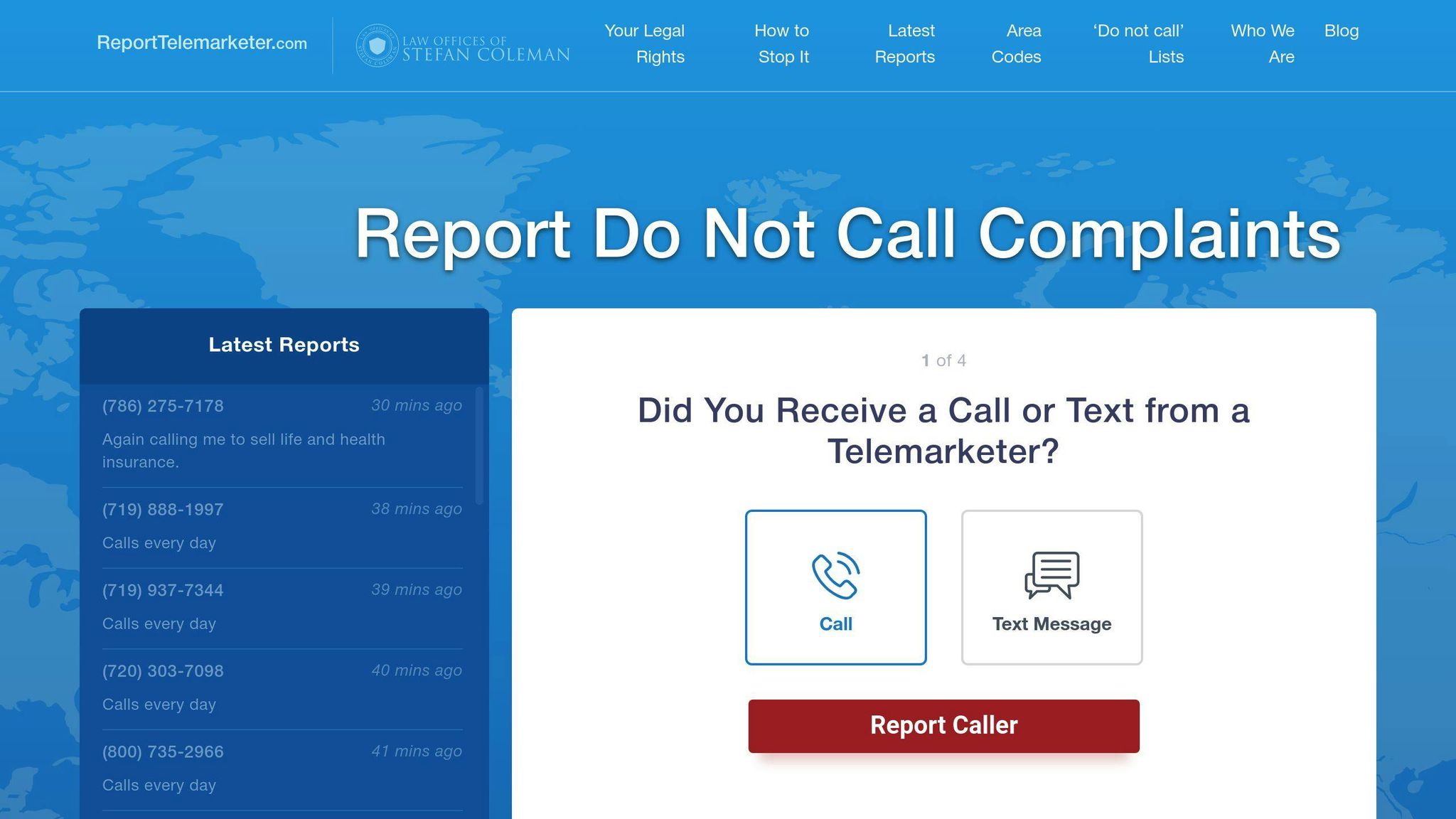
The 2024 updates to the Telephone Consumer Protection Act (TCPA) focus on stricter rules for call recordings and the use of AI in telemarketing. Here’s a quick breakdown:
- Written Consent Required: Businesses must secure written approval before recording any calls, including AI-generated or pre-recorded calls.
- AI Restrictions: AI-cloned voices are banned, and written consent is mandatory for AI-driven marketing calls.
- Penalties: Fines range from $500 to $1,500 per violation, with potential for class-action lawsuits.
- Record Keeping: Consent records must be retained for 4 years.
- State-Level Rules: States like Pennsylvania and Maine have added additional compliance requirements.
Quick Overview of Compliance Changes
| Requirement | New Rule |
|---|---|
| Call Recording | Written consent mandatory |
| AI-Generated Voices | Banned without explicit consent |
| Pre-recorded Messages | Opt-out mechanism required |
| Record Retention | 4 years |
| Monthly Call Limits (Landlines) | Max 3 pre-recorded calls without consent |
These changes aim to protect consumer privacy and address risks posed by modern technology. Businesses must adapt quickly to avoid severe fines and legal issues.
Summary of the New TCPA Rules Regarding National Do Not Call Registry Going Live On January 27, 2025
2024 TCPA Regulation Changes
The TCPA rules have seen major updates in 2024, particularly around call recordings and the use of artificial intelligence in telemarketing.
New Consent Rules for Call Recordings
The 2024 updates now require written consent for all call recordings, along with stricter documentation standards. This applies to both inbound and outbound telemarketing calls.
Here are the key compliance points for call recording:
| Requirement Type | Description | Implementation Deadline |
|---|---|---|
| Prior Consent | Written approval before recording begins | Immediate |
| Monthly Limits | No more than 3 pre-recorded marketing calls to landlines per month without written consent | January 2024 |
| Documentation | Maintain consent records for 4 years | Ongoing |
These rules also cover newer technologies, including AI-driven telemarketing systems.
AI and Automated Voices in TCPA
The updated regulations now address the growing use of AI in telemarketing. These changes aim to strengthen consumer protections in light of modern tech developments.
Key updates include:
- Voice Technology: Robocalls using AI-cloned voices are now banned by the FCC.
- AI Consent Rules: Written consent is mandatory for AI-generated or cloned voices, and robocalls with cloned voices are entirely prohibited.
Some states, like Pennsylvania, West Virginia, and Maine, have introduced additional rules to complement these federal changes.
Businesses using AI or automated systems in telemarketing must ensure compliance with these regulations. Violations can lead to penalties ranging from $500 to $1,500 per violation.
sbb-itb-a8d93e1
Effects of 2024 Updates on Telemarketing
Challenges for Telemarketers
The 2024 TCPA updates have introduced stricter rules, creating new hurdles for telemarketing companies, especially around call recording practices. To meet these updated requirements, businesses need to overhaul their compliance processes.
One major challenge is setting up effective consent management systems. Telemarketers are now required to keep detailed records of written consent for all recorded calls. This means upgrading CRM systems and workflows, which can be both time-consuming and resource-intensive.
| Compliance Area | Implementation Requirements | Business Impact |
|---|---|---|
| Consent Management | Written approval documentation | Higher administrative workload |
| AI Voice Technology | Ban on AI-cloned voices | Adjustments to tech investments |
| Record Keeping | 4-year retention of consent data | Increased storage expenses |
| Contact List Management | Regular DNC registry updates | Added operational steps |
These updates make it clear that staying compliant with the TCPA is not optional – ignoring these rules could lead to steep consequences.
Penalties for Non-Compliance
Failing to meet the updated TCPA requirements can lead to severe financial and reputational damage. For instance, the Dish Network Corp case resulted in a $210 million settlement for making unauthorized calls to numbers on the National DNC Registry.
Base fines range from $500 to $1,500 per violation, but the real costs can include:
- Multi-million-dollar penalties in class action lawsuits
- Legal fees and potential harm to the company’s reputation
"The TCPA is part of the federal response to the robocall epidemic. It regulates telemarketing calls and prevents unsolicited calls to numbers on the national DNC list." – Eric Troutman
Adding to the complexity, states like West Virginia have introduced new rules, such as stricter caller ID requirements. For telemarketers working across different jurisdictions, this means adapting to multiple layers of compliance.
To navigate these challenges, businesses must invest in staff training and regularly update their procedures. Staying ahead of these evolving regulations is essential to avoid penalties and maintain smooth operations.
Reporting and Addressing Call Recording Violations
ReportTelemarketer.com: A Consumer Protection Tool

ReportTelemarketer.com provides a focused and user-friendly option for consumers dealing with call recording violations, offering legal assistance and simplifying case preparation. Unlike filing directly with the FCC, this platform is designed to align with the 2024 TCPA updates, offering tools to investigate and address violations.
| Feature | What It Offers |
|---|---|
| Investigation Tools | Tracks and identifies patterns of violations using specialized technology. |
| Legal Documentation | Helps build strong cases with documented evidence for cease-and-desist letters. |
| Cost-Free Service | Removes financial barriers; attorney fees are claimed from violators. |
| Privacy Protection | Ensures confidentiality throughout the reporting process. |
Once a violation is identified, consumers can take action by following a clear and structured complaint process.
Steps to File a Complaint
The FCC outlines a straightforward process for reporting violations, emphasizing the importance of proper documentation. Here’s how you can proceed:
1. Initial Documentation and Registration
Start by gathering key details about the call:
- Date and time of the call
- Telemarketer’s phone number
- Business name, if provided
- Description of the recording violation
- Confirm that your number is listed on the National Do Not Call Registry
2. Submit Your Complaint
There are several ways to file your complaint, each with varying processing times:
| Filing Method | Processing Time | Required Information |
|---|---|---|
| FCC Website | 1-2 business days | Call details and violation description |
| ReportTelemarketer.com | Same-day processing | Basic contact information |
| FCC Consumer Help Center | 3-5 business days | Full documentation |
"The TCPA has a four-year statute of limitations, allowing for legal proceedings up to four years after a violation".
ReportTelemarketer.com simplifies the process by handling key steps, such as:
- Investigating the telemarketer’s compliance history
- Preparing all necessary legal documentation
- Filing formal complaints when needed
- Initiating cease-and-desist actions
These resources empower consumers to navigate the complexities of the 2024 TCPA updates and take control of their rights under the law.
Conclusion and Future Outlook
Key Points Summary
The 2024 updates to the TCPA have introduced new rules for call recording, reflecting the challenges posed by modern technology. One major change is the FCC’s ban on AI-generated voice robocalls, which takes effect on February 8, 2024. These updates highlight increasing concerns about privacy and consumer rights, as both federal and state regulations adapt to address these issues.
Some of the most important updates include stricter consent requirements for call recordings, tighter controls on pre-recorded calls, and strong restrictions on the use of AI-generated voices in telemarketing. Businesses that fail to comply risk facing hefty fines, as seen in recent enforcement actions.
Preparing for Future Changes
With these updates now in place, businesses must focus on staying ahead of future regulatory shifts. To ensure compliance, companies should prioritize robust consent systems, provide employee training, keep up with state-level rules, and maintain thorough records.
The growing focus on AI-driven telemarketing suggests that even stricter regulations may be on the horizon. This means businesses need to stay alert and ready to adapt as new technologies and automated communication tools continue to reshape the regulatory environment.